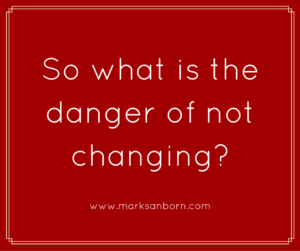 Lots of speakers and consultants like to scare audience and clients. “If you don’t change, you’ll become extinct!”
Lots of speakers and consultants like to scare audience and clients. “If you don’t change, you’ll become extinct!”
Here’s the funny thing: I see lots of staid and stodgy companies that haven’t changed much in years and don’t look like they intend to change any time soon.
Extinction—going out of business—is always a possibility, but for an established company, not highly as likely as others will tell you.
So what is the danger of not changing?
The real threat is mediocrity and boredom. Unmotivated leaders beget unmotivated employees. People come into work and muddle by.
“The difference between a rut and a grave is distance and depth.”
I ran across that idea as a high school student. I thought it corny and didn’t give it a second thought.
That’s because I hadn’t lived long enough to see some of my ruts, and the ruts of others, turn into figurative graves.
Staying on the same path, without being willing to try new paths, seek new destinations or vary your routine is gradually but ultimately life-sapping.
Rather than change and improve because of the threat of extinction, why not get better because of the opportunity of excellence and success?










Mark: Thank you for the post. I agree that “not changing” does not result in extinction…for some organizations. Even without embracing change, some organizations continue to survive. But there is a difference between surviving and thriving.
In order to thrive, organizations must embrace change and get in front of it. They must innovate not only their machines and processes, but also how they view themselves, their competitors, their marketplace, as well as how they engage with their stakeholders. I have witnessed time and time again how embracing change and “getting in front of it” (inevitable or not) enabled organizations to shape their environment. Shaping can make the difference between surviving and thriving, and between “mediocrity” and excellence.
Excellent quote Mark.
And you’re right… There’s no need to “try” to scare audiences into thinking their biz will be extinct tomorrow unless they adopt something new.
Empowering audiences and showing them an improvement or a tweak, that will make business better, serves everyone involved.